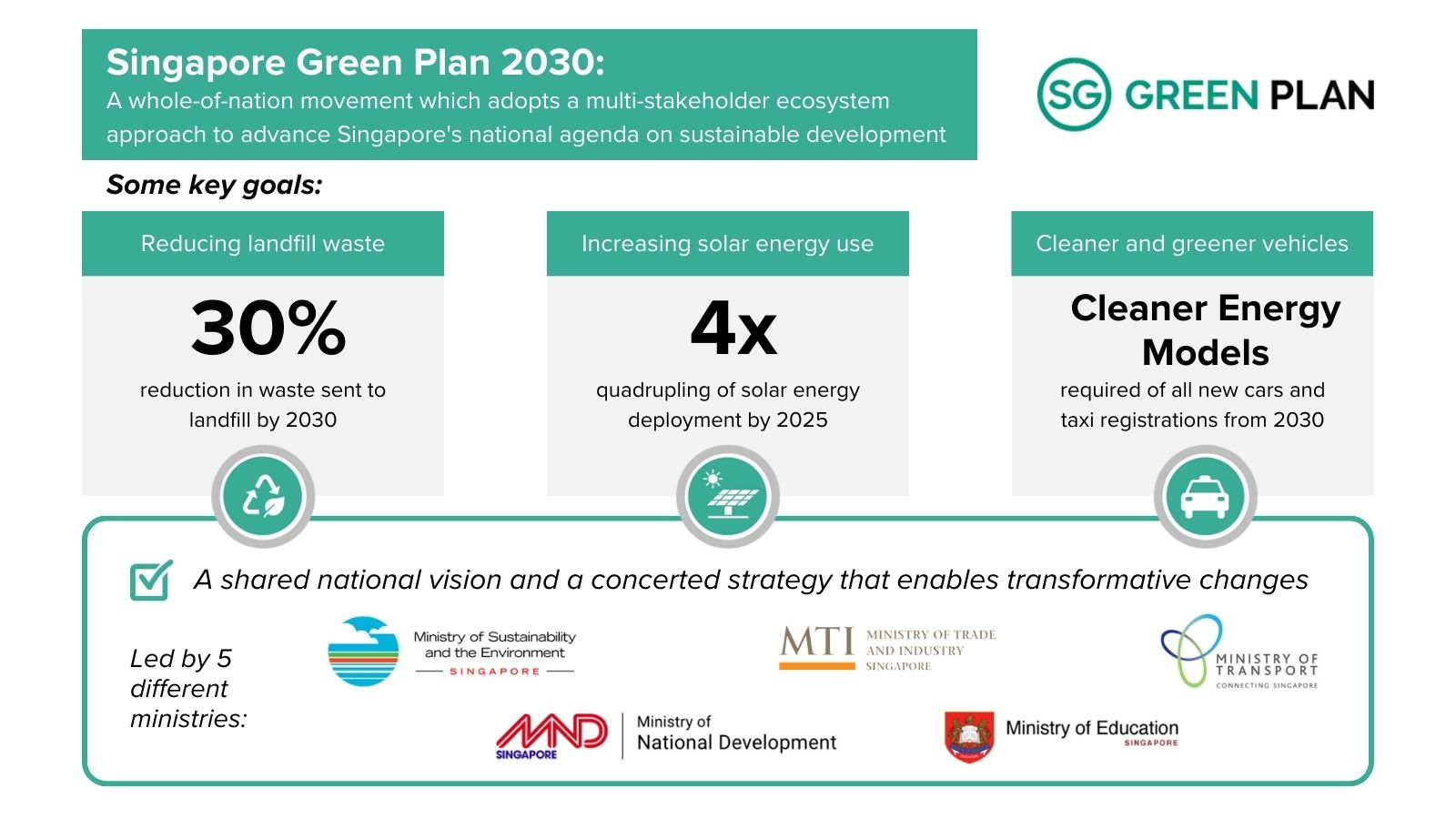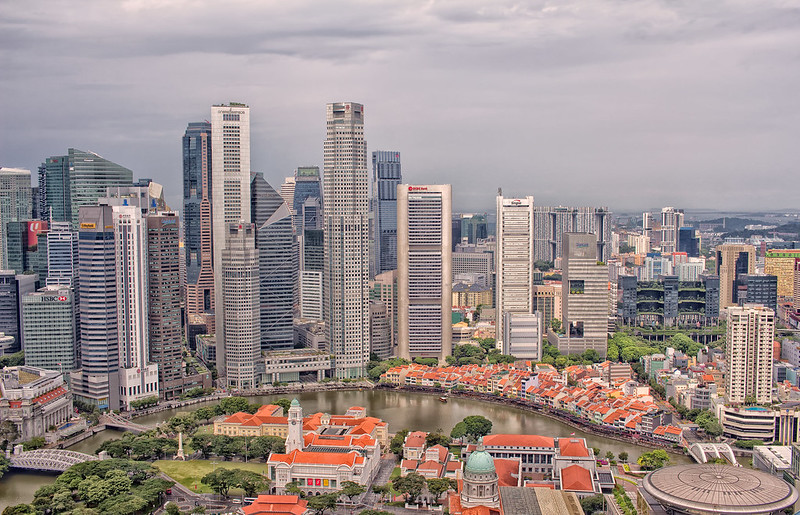
Singapore’s Ambitious Climate Goals
Singapore encounters various climate risks and challenges shaped by its unique national conditions. Several factors play a role in this vulnerability. For instance, the nation has limited renewable energy options and features low-lying coastal areas that are especially vulnerable to rising sea levels. Furthermore, high population density stresses already limited natural resources, while the restricted land space hinders the expansion of solar power, which is the most viable renewable energy option available.
Moreover, Singapore’s economy, heavily reliant on the global supply chain for food and energy, amplifies its sensitivity to worsening climate impacts. In response to these pressing challenges, Singapore has taken a proactive stance by establishing bold and ambitious goals. The country is adopting various mitigation and adaptation measures to enhance its resilience. Specifically, by 2030, Singapore has committed to decarbonize to about 60 MtCO2e after reaching a peak.
Importantly, these objectives form part of a well-structured plan that employs a comprehensive whole-government approach. Additionally, strategic technology investments are being made to accelerate the transition to a low-carbon economy across all sectors, including industry and society.
A multi-stakeholder ecosystem approach: The Singapore Green Plan 2030
Achieving a net-zero future depends on collaboration among key stakeholders, a unified national vision, and a well-coordinated strategy that fosters transformative changes across essential sectors. To this end, the Government of Singapore initiated the Singapore Green Plan 2030 (Green Plan) in 2021. This ambitious initiative is spearheaded by five ministries: the Ministries of Sustainability and the Environment (MSE), Trade and Industry (MTI), Transport (MOT), National Development (MND), and Education (MOE). The Green Plan outlines bold and concrete objectives for the next ten years. For example, it aims to quadruple solar energy deployment by 2025, reduce waste sent to landfill by 30% by 2030, and ensure that all new car and taxi registrations consist of cleaner-energy models starting in 2030.

Singapore’s climate change policies from a whole-of-government perspective
The Green Plan’s multistakeholder approach holds significant importance in Singapore, as it represents a continuation of a nationwide movement that underscores the need to engage everyone in the fight against climate change. This collective vision, spearheaded by the Inter-Ministerial Committee on Climate Change (IMC), is founded on the belief that well-coordinated climate policies and strategies will provide clear guidance to various stakeholders regarding their roles in combating climate change. Moreover, this approach aims to minimize disruptions to both the economy and the workforce, while also facilitating an inclusive transition. As a result, Singapore can maintain its competitiveness in a world increasingly focused on carbon reduction.
At the heart of Singapore’s climate strategy lies its ability to bring key stakeholders together to co-create and co-deliver solutions. The strategy also emphasizes raising awareness, fostering innovation, and promoting collaboration in the effort to address climate change. Additionally, strong governmental commitment has played a crucial role in cultivating numerous public-private partnerships that tackle cross-cutting sustainability issues. For example, the National Research, Innovation, and Enterprise 2020 plan allocated US$660 million for research and development as well as deployment initiatives focused on urban solutions and sustainability. Furthermore, in 2020, the government established the S$50 million SG Eco Fund to support grassroots community projects that promote environmental sustainability.
Singapore: A Living Laboratory For Climate Solutions
Due to significant government investment in research and development, a supportive business environment, and a top-notch legal framework, Singapore has transformed into a vibrant living laboratory. Various stakeholders can effectively develop, test, and commercialize climate solutions aiming for regional and global scalability.
One exemplary initiative is BCA SkyLab, which was established through the collaboration of Singapore’s Building and Construction Authority (BCA) and the Lawrence Berkeley National Laboratory in California. This open innovation lab not only provides industry professionals and researchers with a cutting-edge platform but also enables them to refine and test their technologies. Consequently, participants push the boundaries of energy efficiency well beyond the standards set by Green Mark platinum-rated technologies.
Singapore effectively utilized the living laboratory model to experiment with innovative technologies, exemplified by the launch of the world’s largest 1 MWp floating solar photovoltaic (PV) testbed at Tengeh Reservoir. In 2016, the Public Utilities Board (PUB) and the Singapore Economic Development Board (EDB) initiated this project. The Solar Energy Research Institute of Singapore (SERIS) managed the installation, which featured 10 different floating structures and PV modules made by 9 separate companies. This collaboration allowed for comprehensive performance analysis.
The results demonstrated that the floating solar PV systems surpassed traditional rooftop systems in Singapore while maintaining a minimal ecological footprint when designed thoughtfully. As a result, PUB approved the construction of a 60 MWp floating solar PV system at Tengeh Reservoir.
In addition, academia has significantly contributed to creating the intellectual and resource-based foundation needed to test innovative ideas and transform them into practical solutions. For example, the Environmental & Water Technology Centre of Innovation (EWTCOI) represents a joint effort between Enterprise Singapore (EnterpriseSG) and Ngee Ann Polytechnic (NP).
This center acts as a vital link for Small and Medium Enterprises (SMEs) looking for market-driven technology solutions in areas such as water and membrane technology, sustainable materials, and energy efficiency in the built environment.
Likewise, Nanyang Technological University (NTU) partnered with EnterpriseSG to establish the Singapore Agri-Food Innovation Lab (SAIL). This multi-sector platform promotes collaboration among corporates, start-ups, SMEs, research institutes, and institutes of higher learning (IHLs) in the fields of sustainability, digitalization, agri-inputs, and downstream R&D.

Conclusion:
In summary, Singapore’s proactive approach to climate change, encapsulated in the Singapore Green Plan 2030, underscores the nation’s commitment to sustainability and resilience. By leveraging a multi-stakeholder ecosystem and fostering innovation through government support and collaborative initiatives, Singapore is not only addressing its unique challenges but also positioning itself as a global leader in climate solutions. This comprehensive strategy demonstrates the importance of a coordinated response to environmental issues, paving the way for transformative action in the face of climate disruption.


